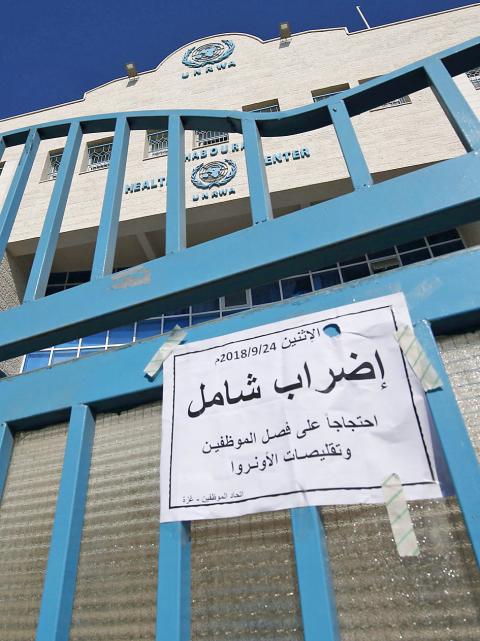The Gaza Strip’s economy is in “free fall” as cuts to aid and salaries add to an already crippling Israeli blockade on the Hamas-run enclave, the World Bank said on Tuesday.
The bank’s report is to be presented to the international donor group for Palestinians, known as the Ad Hoc Liaison Committee, tomorrow at its meeting on the sidelines of the UN General Assembly in New York City.
The meeting is to coincide with the speeches to the assembly of Palestinian President Mahmoud Abbas and Israeli Prime Minister Benjamin Netanyahu.

Photo: AFP
Already squeezed by a more than decade-long Israeli blockade, Gaza’s economy has been further weakened by US aid cuts and financial measures by Abbas’ Palestinian Authority.
Abbas has been seeking to pressure Islamic movement Hamas, which expelled his loyalists from the territory in 2007, as well as save costs.
He has reduced monthly payments to Gaza by about US$30 million, according to the World Bank.
US President Donald Trump’s administration has cut more than US$500 million in aid to the Palestinians, including ending all support for the UN Relief and Works Agency for Palestine Refugees.
“The economic deterioration in both Gaza and West Bank can no longer be counteracted by foreign aid, which has been in steady decline, nor by the private sector, which remains confined by restrictions on movement, access to primary materials and trade,” the bank said.
Gaza’s economy shrunk by 6 percent in the first quarter of this year “with indications of further deterioration since then,” it said.
One in two Gazans now lives below the poverty line and unemployment is 53 percent, the bank said, adding that more than 70 percent of young people are jobless.
“Increased frustration is feeding into the increased tensions which have already started spilling over into unrest and setting back the human development of the region’s large youth population,” World Bank director for the West Bank and Gaza Marina Wes said.
On Thursday last week, UN envoy for the Middle East peace process Nickolay Mladenov told the UN Security Council that “Gaza can explode any minute.”
Israel and Palestinian militants in Gaza have fought three wars since 2008.
In recent months, mass protests along Gaza’s border with Israel have triggered repeated deadly clashes with the army, prompting warnings of the risk of a new conflict.
At least 187 Palestinians have been killed by Israeli fire since the protests began on March 30. One Israeli soldier has been killed in that time.
Israel says its actions are necessary to defend the border and accuses Hamas of using the protests as cover to attempt infiltrations and attacks.
Palestinians and human rights groups say protesters have been shot while posing no real threat.
Mladenov and Egyptian officials have been seeking to broker a long-term truce between Israel and Hamas, but those efforts have stalled in recent weeks.

PATENTS: MediaTek Inc said it would not comment on ongoing legal cases, but does not expect the legal action by Huawei to affect its business operations Smartphone integrated chips designer MediaTek Inc (聯發科) on Friday said that a lawsuit filed by Chinese smartphone brand Huawei Technologies Co (華為) over alleged patent infringements would have little impact on its operations. In an announcement posted on the Taiwan Stock Exchange, MediaTek said that it would not comment on an ongoing legal case. However, the company said that Huawei’s legal action would have little impact on its operations. MediaTek’s statement came after China-based PRIP Research said on Thursday that Huawei filed a lawsuit with a Chinese district court claiming that MediaTek infringed on its patents. The infringement mentioned in the lawsuit likely involved

Taipei is today suspending work, classes and its US$2.4 trillion stock market as Typhoon Gaemi approaches Taiwan with strong winds and heavy rain. The nation is not conducting securities, currency or fixed income trading, statements from its stock and currency exchanges said. Authorities had yesterday issued a warning that the storm could affect people on land and canceled some ship crossings and domestic flights. Taiwan Semiconductor Manufacturing Co (TSMC, 台積電) expects its local chipmaking fabs to maintain normal production, the company said in an e-mailed statement. The main chipmaker for Apple Inc and Nvidia Corp said it has activated routine typhoon alert

GROWTH: TSMC increased its projected revenue growth for this year to more than 25 percent, citing stronger-than-expected demand for AI devices and smartphones The Taiwan Institute of Economic Research (TIER, 台灣經濟研究院) yesterday raised its forecast for Taiwan’s GDP growth this year from 3.29 percent to 3.85 percent, as exports and private investment recovered faster than it predicted three months ago. The Taipei-based think tank also expects that Taiwan would see a 8.19 percent increase in exports this year, better than the 7.55 percent it projected in April, as US technology giants spent more money on artificial intelligence (AI) infrastructure and development. “There will be more AI servers going forward, but it remains to be seen if the momentum would extend to personal computers, smartphones and

Catastrophic computer outages caused by a software update from one company have once again exposed the dangers of global technological dependence on a handful of players, experts said on Friday. A flawed update sent out by the little-known security firm CrowdStrike Holdings Inc brought airlines, TV stations and myriad other aspects of daily life to a standstill. The outages affected companies or individuals that use CrowdStrike on the Microsoft Inc’s Windows platform. When they applied the update, the incompatible software crashed computers into a frozen state known as the “blue screen of death.” “Today CrowdStrike has become a household name, but not in